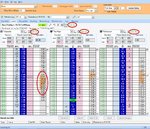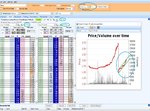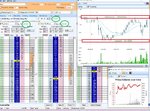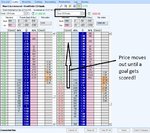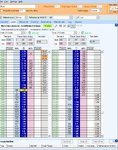You are using an out of date browser. It may not display this or other websites correctly.
You should upgrade or use an alternative browser.
You should upgrade or use an alternative browser.
ffsear
Guest Author
- Messages
- 2,304
- Likes
- 551
You may notice some similarities.... 🙂
Ten common mistakes made by traders on Betfair
1. Trading Timescales
You must make sure that you match the timescale of your prediction of the price's movement with the amount of time you hold your position.
A classic mistake is trading on the favourite's price three minutes before the race and you see that the price is being backed heavily and is thus shortening (decreasing). You think that this horse has a really good chance of winning so in addition to trading you decide to back it.
WRONG!!! If you do that you are basing a short term trading decision on a long term view of the price. The timescale of your prediction of the price, i.e. that the price will go down because the horse will win the race, is different from the intended timescale of your trade.
You intended to make a profit in a minute or less. Now unless you're going to hold the bet until the race has finished then you can't base trading decisions on where you think the price will be when the race has finished.
2. Not getting out instantly
To avoid losses traders have to be extremely short term.
To trade without knowing anything about what is going on, you have to assume that any movement against you is going to carry on going against you in the most painful way it can. This isn't too drastic of an assumption, as anyone that's held onto a losing trade only to see it get worse and worse will agree.
Without any knowledge to the contrary you have to assume the worst, and the only protection against this is not to be in harm's way: The less time you're in a position, the less can go wrong.
Take your profits quickly and your scratch trades and losses even quicker. By quickly I mean instantly, profit scratch or loss you should be out, or at least have your counter trade in, within 10 or 20 seconds at the most.
3. Not doing scratch trades
The scratch trade is where you lay and back the selection at the same price.
There is a tendency amongst new traders to see the scratch trade as a waste of time. Once someone has made a scratch trade, only to then see the price move the right way they tend to stop doing them. The new trader can't get it out of his mind that the scratch trade just cost him a profit and stops doing them.
However, human nature will always make us dwell on what we just missed out on without appreciating what we've got. A scratch trade that gets you out of the market before the price suddenly turns against you is soon forgotten about as the trader quietly congratulates his trading skills and quickly forgets all about it.
A missed profit has a different effect on many people than a saved loss of the same size has. The fewer scratch trades you do the more losses you will have, that is a fact, so therefore you need more profits just to get back the extra that you're losing. It's far better to not lose and then to not win than it is to lose and then win.
4. Letting losing trades ride as bets
To be a successful trader you must be taking profits and losses of roughly the same size, but having more profits than losses, the scratch trade taking the place of the losses.
As soon as you start to let your losses get bigger than your profits you're creating an uphill battle for yourself because then you need to have lots more profits than losses just to break even.
The absolute worst thing you can do is hold on to a trade because it went against you and let it ride as the race runs. Risking your whole bank because you couldn't accept a small one or two-tick loss is stupid. This is gambling at its worst. If you want to gamble then gamble but at least do it properly. Don't do a hybrid mix of trading and gambling where you're doing each one badly. You know that in the long run it's going to end in tears so why do it?
There's no point in winning nine times and losing once if your loss is 50 times the size of your profit. That instantly wipes out more than a whole day of successful trading. Anyone with such a complete lack of discipline not only will lose but deserves to lose.
4. Reading form and watching Racing
As a short-term trader the last things you should do are read form and watch racing on television. This is for people who wish to gamble on the outcome of the race.
Not only are they distractions from trading but they implant biases in the trader's mind that detract from his ability to concentrate solely on the numbers and the patterns of movement they create. A trader shouldn't read the racing paper or switch on the television and should only log in to Betfair at the most 20 minutes before the first race.
6. Wanting to enjoy the racing
Trading is often described as boring and detracting from the enjoyment of racing. This may be the case but horse racing is of no concern to the trader so this comment is meaningless. Horse racing has nothing to do with what a trader is doing.
Wanting to enjoy the racing or enjoy your betting is fine but you cannot trade successfully at the same time. You can do one or the other but not both. Trading requires concentration and dedication and if you're watching horse racing at the same time then you are being unprofessional.
7. Over-thinking trades
Over-thinking trades has two drawbacks: firstly, cuts down their potential to make money by limiting the number of trades and secondly when the trigger is pulled they have put so much thought and effort into their trade that they fall in love with it. They are unwilling to get out of such a trade with an almost-instant scratch trade or an almost-instant small loss. This is why people ride their losses and end up gambling due to their inability to accept so quickly that they were wrong.
Instead of entering into a trade with the confidence that you are right, each trade should instead be entered with the assumption that you are wrong with a willingness to react correctly if indeed you are wrong. As much as you may have built up your reasoning for the trade you just did, you must remember that you don't actually know anything about what is going on and it's alright to be wrong.
8. Not purchasing specialist trading software
If you wish to make money purely from trading, then it is worth every penny in subscribing to specialist software such as BetTrader PRO. They say necessity is the mother of invention and that's definitely the case with these products.
The Betfair interface has been developed to cater for many different types of customer. If you want to specialise in trading and especially scratch trading, then invest in a specialist product. Having live price feeds and one click bet submission at any price, lay or back, gives the trader the absolute flexibility he needs to turn on a sixpence which the Betfair website and most other trading applications don't allow. It's the old adage - you need to spend money to make money. Visit the Betfair Solutions Directory for further information on trading applications built by Betfair licensed software vendors. There are a variety of programmes available with a wide range of features, suitable for every type of trader.
9. Getting distracted
Don't check emails, answer the phone, use instant messenger, other websites or the Betfair forum while the racing is on, this includes the slack period between races when you have 'greened up your position'. That's the time where you can sit back for a few minutes while nothing much is happening and relax a bit, but you must still watch the price and be aware of what is happening.
It is very easy to get distracted and effect your trading. To really get in the groove you have to concentrate on every race, moving onto the next race when that one is due to start. Don't take your eyes from the screen except when nature calls. If you smoke then smoke in front of the computer or not at all, nipping out for a cigarette will cost you thousands of pounds over the course of a year.
The key is to concentrate for three and a half hours. You are a trader and nothing else, you'll be surprised how much better you trade when you don't allow any outside distractions of any kind, letting yourself be absorbed by what you are doing and really seeing the movements and imagining what they might do next.
10. Trading for a profit of a pre-determined size
Many people decide how much they want to make out of a trade before they enter it and then set their exit price according to that rather than what it looks like they can reasonably get now. Wanting to make two ticks is great but putting your counter-trade in two ticks higher than you just laid at is gambling, not trading.
It may go up but likewise could come in, if you can't get out straight away with a profit you should ask for a smaller profit. If you can't get the smaller profit straight away you should scratch, and if you miss the scratch trade you should take a small loss. If instead of all that you remain motionless with your counter-trade still in at the same price waiting for your two tick profit then you are gambling and will have your share of profits but also your share of big losses.
Ten common mistakes made by traders on Betfair
1. Trading Timescales
You must make sure that you match the timescale of your prediction of the price's movement with the amount of time you hold your position.
A classic mistake is trading on the favourite's price three minutes before the race and you see that the price is being backed heavily and is thus shortening (decreasing). You think that this horse has a really good chance of winning so in addition to trading you decide to back it.
WRONG!!! If you do that you are basing a short term trading decision on a long term view of the price. The timescale of your prediction of the price, i.e. that the price will go down because the horse will win the race, is different from the intended timescale of your trade.
You intended to make a profit in a minute or less. Now unless you're going to hold the bet until the race has finished then you can't base trading decisions on where you think the price will be when the race has finished.
2. Not getting out instantly
To avoid losses traders have to be extremely short term.
To trade without knowing anything about what is going on, you have to assume that any movement against you is going to carry on going against you in the most painful way it can. This isn't too drastic of an assumption, as anyone that's held onto a losing trade only to see it get worse and worse will agree.
Without any knowledge to the contrary you have to assume the worst, and the only protection against this is not to be in harm's way: The less time you're in a position, the less can go wrong.
Take your profits quickly and your scratch trades and losses even quicker. By quickly I mean instantly, profit scratch or loss you should be out, or at least have your counter trade in, within 10 or 20 seconds at the most.
3. Not doing scratch trades
The scratch trade is where you lay and back the selection at the same price.
There is a tendency amongst new traders to see the scratch trade as a waste of time. Once someone has made a scratch trade, only to then see the price move the right way they tend to stop doing them. The new trader can't get it out of his mind that the scratch trade just cost him a profit and stops doing them.
However, human nature will always make us dwell on what we just missed out on without appreciating what we've got. A scratch trade that gets you out of the market before the price suddenly turns against you is soon forgotten about as the trader quietly congratulates his trading skills and quickly forgets all about it.
A missed profit has a different effect on many people than a saved loss of the same size has. The fewer scratch trades you do the more losses you will have, that is a fact, so therefore you need more profits just to get back the extra that you're losing. It's far better to not lose and then to not win than it is to lose and then win.
4. Letting losing trades ride as bets
To be a successful trader you must be taking profits and losses of roughly the same size, but having more profits than losses, the scratch trade taking the place of the losses.
As soon as you start to let your losses get bigger than your profits you're creating an uphill battle for yourself because then you need to have lots more profits than losses just to break even.
The absolute worst thing you can do is hold on to a trade because it went against you and let it ride as the race runs. Risking your whole bank because you couldn't accept a small one or two-tick loss is stupid. This is gambling at its worst. If you want to gamble then gamble but at least do it properly. Don't do a hybrid mix of trading and gambling where you're doing each one badly. You know that in the long run it's going to end in tears so why do it?
There's no point in winning nine times and losing once if your loss is 50 times the size of your profit. That instantly wipes out more than a whole day of successful trading. Anyone with such a complete lack of discipline not only will lose but deserves to lose.
4. Reading form and watching Racing
As a short-term trader the last things you should do are read form and watch racing on television. This is for people who wish to gamble on the outcome of the race.
Not only are they distractions from trading but they implant biases in the trader's mind that detract from his ability to concentrate solely on the numbers and the patterns of movement they create. A trader shouldn't read the racing paper or switch on the television and should only log in to Betfair at the most 20 minutes before the first race.
6. Wanting to enjoy the racing
Trading is often described as boring and detracting from the enjoyment of racing. This may be the case but horse racing is of no concern to the trader so this comment is meaningless. Horse racing has nothing to do with what a trader is doing.
Wanting to enjoy the racing or enjoy your betting is fine but you cannot trade successfully at the same time. You can do one or the other but not both. Trading requires concentration and dedication and if you're watching horse racing at the same time then you are being unprofessional.
7. Over-thinking trades
Over-thinking trades has two drawbacks: firstly, cuts down their potential to make money by limiting the number of trades and secondly when the trigger is pulled they have put so much thought and effort into their trade that they fall in love with it. They are unwilling to get out of such a trade with an almost-instant scratch trade or an almost-instant small loss. This is why people ride their losses and end up gambling due to their inability to accept so quickly that they were wrong.
Instead of entering into a trade with the confidence that you are right, each trade should instead be entered with the assumption that you are wrong with a willingness to react correctly if indeed you are wrong. As much as you may have built up your reasoning for the trade you just did, you must remember that you don't actually know anything about what is going on and it's alright to be wrong.
8. Not purchasing specialist trading software
If you wish to make money purely from trading, then it is worth every penny in subscribing to specialist software such as BetTrader PRO. They say necessity is the mother of invention and that's definitely the case with these products.
The Betfair interface has been developed to cater for many different types of customer. If you want to specialise in trading and especially scratch trading, then invest in a specialist product. Having live price feeds and one click bet submission at any price, lay or back, gives the trader the absolute flexibility he needs to turn on a sixpence which the Betfair website and most other trading applications don't allow. It's the old adage - you need to spend money to make money. Visit the Betfair Solutions Directory for further information on trading applications built by Betfair licensed software vendors. There are a variety of programmes available with a wide range of features, suitable for every type of trader.
9. Getting distracted
Don't check emails, answer the phone, use instant messenger, other websites or the Betfair forum while the racing is on, this includes the slack period between races when you have 'greened up your position'. That's the time where you can sit back for a few minutes while nothing much is happening and relax a bit, but you must still watch the price and be aware of what is happening.
It is very easy to get distracted and effect your trading. To really get in the groove you have to concentrate on every race, moving onto the next race when that one is due to start. Don't take your eyes from the screen except when nature calls. If you smoke then smoke in front of the computer or not at all, nipping out for a cigarette will cost you thousands of pounds over the course of a year.
The key is to concentrate for three and a half hours. You are a trader and nothing else, you'll be surprised how much better you trade when you don't allow any outside distractions of any kind, letting yourself be absorbed by what you are doing and really seeing the movements and imagining what they might do next.
10. Trading for a profit of a pre-determined size
Many people decide how much they want to make out of a trade before they enter it and then set their exit price according to that rather than what it looks like they can reasonably get now. Wanting to make two ticks is great but putting your counter-trade in two ticks higher than you just laid at is gambling, not trading.
It may go up but likewise could come in, if you can't get out straight away with a profit you should ask for a smaller profit. If you can't get the smaller profit straight away you should scratch, and if you miss the scratch trade you should take a small loss. If instead of all that you remain motionless with your counter-trade still in at the same price waiting for your two tick profit then you are gambling and will have your share of profits but also your share of big losses.
itspossible
Senior member
- Messages
- 2,796
- Likes
- 570
best of luck with the marathon.is nick sponsoring u😈
Oscar Reed
Senior member
- Messages
- 2,485
- Likes
- 739
I'm running the London marathon on Sunday, so no more updates for a few days while I try to relax and recover. Looking forward to my first pint in a good few weeks on Sunday afternoon along with watching palace in the semi final.
Have a good weekend
Good luck.
Watch out for sore nipples.🙁
http://www.runnersworld.com/ask-coach-jenny/how-to-prevent-nipple-chafing
new_trader
Legendary member
- Messages
- 6,770
- Likes
- 1,656
Good luck
Remember, you only need to run 26 miles not 52! :clover:
I'm running the London marathon on Sunday, so no more updates for a few days while I try to relax and recover. Looking forward to my first pint in a good few weeks on Sunday afternoon along with watching palace in the semi final.
Have a good weekend
Remember, you only need to run 26 miles not 52! :clover:
ffsear
Guest Author
- Messages
- 2,304
- Likes
- 551
Was it shoulder to shoulder?
2016


First 12 miles was pact, you can't get past people, the support spills out onto the road leaving very little space. Its best not to waste energy zig zaging through in and out of people.
I look good though with 600 metes to go.! ( you don't don't wanna see what i looked like a mile earlier, not a pretty site)

Attachments
Last edited:
ffsear
Guest Author
- Messages
- 2,304
- Likes
- 551
Waited for the first goal, which was later then expected . £105 at half time on under 2.5 goals, spurs goal was very scrappy and west brom got 9 men behind the ball. SO a very easy to scalp the trend after the first goal (as highlighted on the graph). not expecting many goals here, neither is the market, the backers are getting eaten up very quickly.
Gonna have to lose £105.26 to keep my £3.78 record on track. 😆

Gonna have to lose £105.26 to keep my £3.78 record on track. 😆

Attachments
Last edited:
ffsear
Guest Author
- Messages
- 2,304
- Likes
- 551
is nick sponsoring u😈
If all his multi nicks all chucked in a quid each, Id prob be +£100'
hhiusa
Senior member
- Messages
- 2,687
- Likes
- 140
If all his multi nicks all chucked in a quid each, Id prob be +£100'
People talk about multi nicks a lot. I thought they had IP detection for that. Wouldn't it be obvious if 100 usernames used the same IP address?
ffsear
Guest Author
- Messages
- 2,304
- Likes
- 551
People talk about multi nicks a lot. I thought they had IP detection for that. Wouldn't it be obvious if 100 usernames used the same IP address?
They use the Tor browse. www.torproject.org/ , which changes IP every 20 minutes or so. It becomes quite obvious when someones been on the site for only year and has over 200 different ip addresses. Even more obvious when certain users show up as having the same dodgy IP's
But they out themselves eventually. Posting Style, Bringing up subjects that occurred well before they joined the site, general attitude toward posters and moderators they (apparently) have no history with with their current username. If you've been around long enough, its very easy to spot.
Also every now and again, tor would switch their IP mid post, while they were on this site, which stopped certain functions working. Complaining about it wan't the brighest idea.
e.g Previous banned users using TOR who eventually got caught out. They turned out to be the same person!
http://www.trade2win.com/boards/t2w-feedback-announcements/192626-privacy-issues.html
http://www.trade2win.com/boards/t2w-feedback-announcements/205464-quick-links-button.html
http://www.trade2win.com/boards/t2w-feedback-announcements/178018-frustrations-using-tor-t2w.html
Thankfully i don't have to police these clowns anymore, so I just stick them on ignore.
Last edited:
hhiusa
Senior member
- Messages
- 2,687
- Likes
- 140
They use the Tor browse. www.torproject.org/ , which changes IP every 20 minutes or so. It becomes quite obvious when someones been on the site for only year and has over 200 different ip addresses. Even more obvious when certain users show up as having the same dodgy IP's
But they out themselves eventually. Posting Style, Bringing up subjects that occurred well before they joined the site, general attitude toward posters and moderators they (apparently) have no history with with their current username. If you've been around long enough, its very easy to spot.
Also every now and again, tor would switch their IP mid post, while they were on this site, which stopped certain functions working. Complaining about it wan't the brighest idea.
e.g Previous banned users using TOR who eventually got caught out. They turned out to be the same person!
http://www.trade2win.com/boards/t2w-feedback-announcements/192626-privacy-issues.html
http://www.trade2win.com/boards/t2w-feedback-announcements/205464-quick-links-button.html
http://www.trade2win.com/boards/t2w-feedback-announcements/178018-frustrations-using-tor-t2w.html
Thankfully i don't have to police these clowns anymore, so I just stick them on ignore.
Those links were very informative and amusing.
Thank you. 👍
ffsear
Guest Author
- Messages
- 2,304
- Likes
- 551
You can also you candle sticks in sports trading, if you have the right software.
They contain all the same indicators (macd, rsi) if thats your thing. that you'd get on most platforms. You can set the candles to your chosen time frame. I use 5 second candles.
IT more simplified too, just play support and resistance. No hedgefunds, market makers or bankers causing fake breakouts etc.
Here's a race i just traded, laying at support, backing at resistance.

They contain all the same indicators (macd, rsi) if thats your thing. that you'd get on most platforms. You can set the candles to your chosen time frame. I use 5 second candles.
IT more simplified too, just play support and resistance. No hedgefunds, market makers or bankers causing fake breakouts etc.
Here's a race i just traded, laying at support, backing at resistance.

Attachments
Last edited:
ffsear
Guest Author
- Messages
- 2,304
- Likes
- 551
A decent profit on Saints Vs Spurs. I layed spurs when the score was 1-1, obviously the price is only going to move out while the score remains level and the price for the draw will come in. Saints were looking decent at the back, the a goal by the saints spurs price to move right out.
Layed spurs at 2.98 (15/8). Backed them at 17.50 ( 16/1)
£414 profit no mater the result.


Layed spurs at 2.98 (15/8). Backed them at 17.50 ( 16/1)
£414 profit no mater the result.


Last edited:
Similar threads
- Replies
- 34
- Views
- 36K
- Replies
- 31
- Views
- 7K


